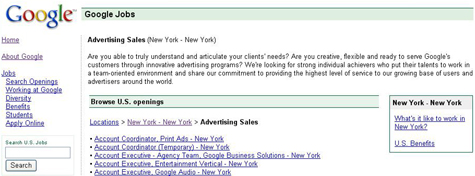Google: Technology driven or people driven?

Can Google CEO Eric Schmidt make it in NYC? I asked last October upon the grand opening of the spanking new East coast Googleplex in Manhattan’s Chelsea.
WHY? Because Google proudly declares it is an engineering company, not a media company, despite the fact that its $10 billion in Internet ad sales is the sole fuel behind its $150 billion market cap.
Prior to christening the new and improved Google digs, Schmidt addressed the NYC media community at a Conde Nast hosted luncheon in June, as I recount in “Google CEO on ad sales execs: Google ‘targeted ads’ better.”
The ever supremely confident Google CEO took the opportunity to extol to a media capital of the world audience of publishing and ad sales execs the virtues of Google’s automated self-serve ad system over flesh and blood sales people.
Schmidt, in his own words:
As people see targeted advertising as a way of selling they shift sales dollars, not marketing dollars, into advertising. Literally, they would put advertising dollars into Google rather than hiring a sales person.
Eventually we would hope that a targeted ad would be better than a targeted sales person; The ad can serve 24 hours a day, the ad can serve anywhere, and the ad is cheaper. The ad doesn’t require a lot of management overhead and is much more cost effective to deploy.
Why then is Google, itself, looking to hire dozens of sales people for its NYC office?

Scott Karp postulates that “Google acquired DoubleClick to create a people-driven advertising platform,” noting that “It’s no accident that Google’s New York office has more humans than servers.”
Yes, BUT that doesn’t mean all of the humans are sales people, not engineers!
The NYC Googleplex, in fact, is run by engineers, three of them, not sales or corporate management execs, and they oversee several hundred engineers working on more than 100 engineering projects.
SEE: Google NYC First Look: Top Google engineer talks to NYC software industry and Google challenges NYC software engineers and Google Engineering: The REAL story
SO, what is the Google bottom line then on the human side of the advertising equation? Is Google really moving to a more high-touch ad sales approach to better compete for brand advertising dollars?
Not exactly. Joanne Bradford, Microsoft Corporate Vice President, told me at Advertising Week last Fall that she has had discussions with Schmidt about his philosophy on how automated ad systems will displace sales people and indicated that she disagrees with him.
Here is the exchange, as reported by Microsoft:
DONNA BOGATIN: Hi. I appreciated you standing up for salespeople and the advertising business, but it actually struck me that Eric Schmidt in June had the opposite approach. When he spoke to publishing media executives in June, he was proud that the Google self-service ad model would get rid of salespeople.
JOANNE BRADFORD: Yeah – (laughter) – you know what, I've actually had that conversation with Eric Schmidt about how he views the ad sales business and what they need to do from an ROI and an asset perspective, and we actually believe the complete opposite. When we survey our customers, the number one thing that they want is a relationship and they want it to be a quality relationship. So the No. 1 driver in the advertising business is relationship, that you know the people that you're buying from and that you're selling to. The No. 2 thing is the quality of service, do you answer the bell when it rings, the request. The No. 3 thing is, is your product in the right place. And the No. 4 thing is price.
So our research shows that it's exactly opposite to the Google approach. They're driving on price and product, then quality of service and relationship. And so we have a very different philosophical approach to it. I actually believe that the industry wants to have many different choices. One of the things I love about the advertising industry is the competition, so it's ABC against CBS and NBC, it's AOL versus Yahoo! and MSN and Google. And so I don't think that the advertising business will cede to an automated buying and selling environment, because people care too much about their brand.
You can't turn your brand over to a machine, you can't turn your brand and your advertising placements over to an automated tool. People's brands are too important to them, they're too important to the consumer, and there's too much differentiation that has to happen. So I still think that there's a very important part of the advertising business that is built on that and the marketing business.
Any other questions? That was a good one, huh?
Has Schmidt had a sudden $3.1 billion DoubleClick change of heart? Not likely.
Karp says the main reason Google is buying DoubleClick is for its “relationships.”Yes, BUT, the The DoubleClick “relationships” that Google is paying $3.1 billion for are not of the Madison Avenue three martini lunch variety, they are of the black and white, irrevocable, multi-year contractual advertising agreement type.
Google may have billions of cash to spare (thanks to its automated advertising system), and give away free lunches to its employees so they never leave their work at the Googleplex for food or drink, but the King of Internet advertising is not planning on realizing its mission of controlling the world’s advertising, profitably, by schmoozing with clients one-on-one.
ALSO: Microsoft vs. Google: Will MSN, Windows Live compete? and
Google DoubleClick merger: Who wins, who loses and
Google DoubleClick marriage (can be) risky business and
Google hurts Yahoo with DoubleClick deal and
Google: $3.1 billion cash for Web monopoly! and
Google to tag users across Web: Privacy Boomerang?